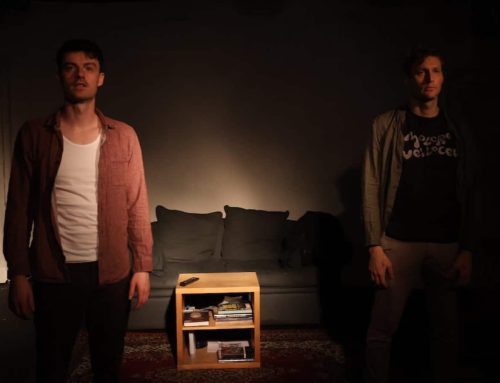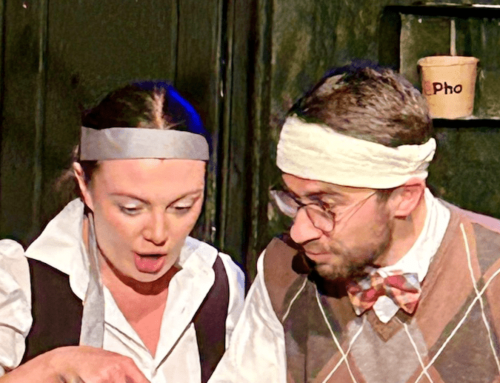Peter Cook’s one-man comedy-drama about addiction and rehabilitation, Breaking The Castle, covers much familiar territory. Think Trainspotting set down-under. The protagonist Dave is an anxious, self-loathing, self-sabotaging actor who lives in a dingy apartment littered with half-eaten takeaways, half-read books, and half-empty liquor bottles. The feel of a life half-lived is unmistakable.
Dave fantasises about playing Hamlet or King Lear at Sydney Opera House but struggles to land a part as a talking cockroach on an insecticide advertisement. Given how much vodka, methamphetamine, and cocaine he puts away perhaps The Iceman Cometh or Long Days Journey Into Night might be more apposite vehicles for his talents.
Estranged from his family, Dave’s human connections mostly come in the form of random drug-fuelled, hook-ups with sex workers he locates prowling the streets of Sydney’s Kings Cross. The lad has not had a sober day in two years. Something has to give. Inevitably Dave (performed with immense empathy by Cook) hits rock bottom. Three nights without sleep sees him sectioned for drug-induced psychosis at the local hospital. It is not the first time, but try as they might, the psychiatrists and psychologists just cannot get him to acknowledge he has a problem.
Best mate Frank manages to rustle up the funds to send Dave to rehab in Thailand. It is “the United Nations of addiction”: a kind of five-star resort with breakfast buffets and inviting pools. Only the barbed wire on the fences hints at the venue’s serious intent. Will Dave’s group-therapy fellows and plain-talking counsellor finally get him to break the castle surrounding him and own up to who he really is? Or is he just “another relapse waiting to happen”?
Breaking The Castle’s narrative tropes are not particularly ground-breaking. The no-nonsense, therapist-as-saviour figure comes direct from a dozen hospital dramas, as do the drip-drip revelations of childhood trauma (sexual abuse and unresolved grief) that ostensibly underpin Dave’s desire to disassociate from reality. Some questioning of the disease model of addiction, or indeed why rehab so often fails, might bring some rounding out here.
Nevertheless, what sets this show above bog-standard addiction-drama territory is the quality and honesty of Cook’s writing. Dave’s internal discourse as he battles with a dozen demonic inner voices fizzes with a kind of brutal comic vigour. The sparring, confrontational dialogue between counsellor and patient crackles with the energy of a runaway roller-coaster. Cook’s performance is top-notch too; bringing compassion, humanity, and understanding to a character who is, in many ways, deeply unlikeable. Anyone who has ever been, or known, an addict, will recognise this story.
Writer: Peter Cook
Director: Bridget Boyle
More Recent Reviews
Playfight. Soho Theatre.
Writer Julia Grogan’s breathtakingly assured debut play arrives at Soho Theatre following stellar reviews at the Edinburgh Fringe and [...]
All The Happy Things. Soho Theatre.
Naomi Denny’s three-hander comedy-drama All The Happy Things covers familiar themes within a recognisable premise. A grieving protagonist comes [...]
Telly. Bread and Roses Theatre.
The challenge with absurdist comedy is that many people do not find it funny. Laughing at the sheer weirdness [...]






